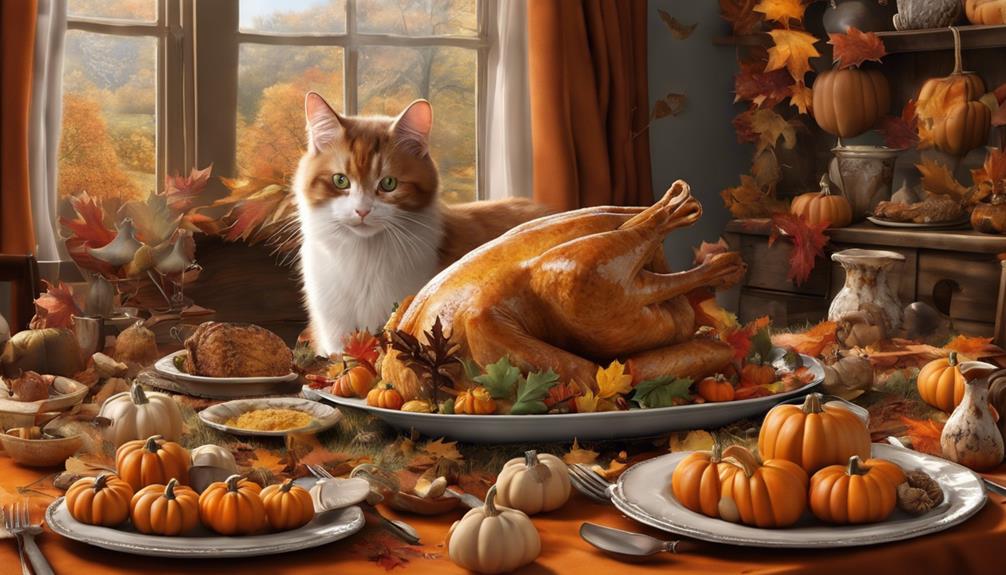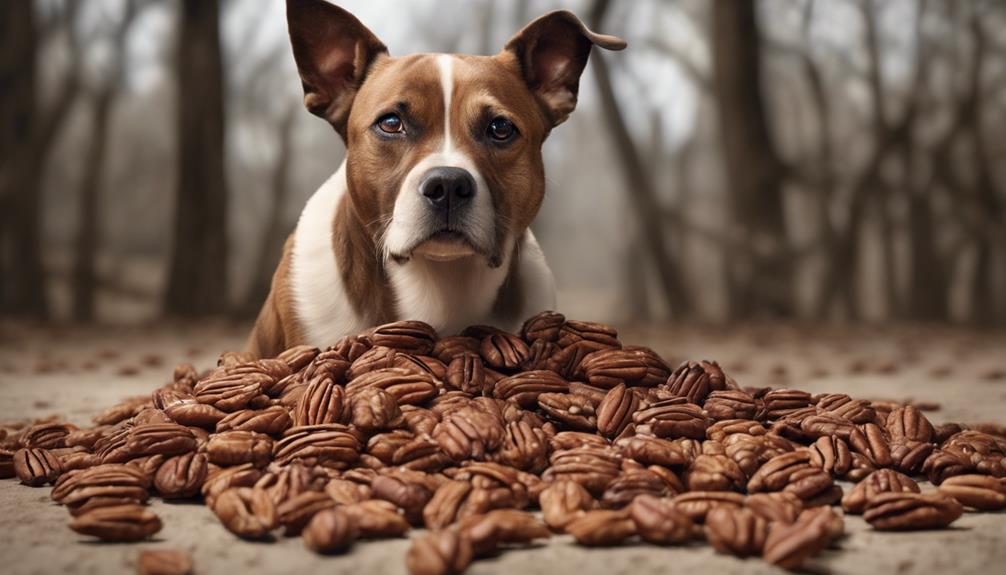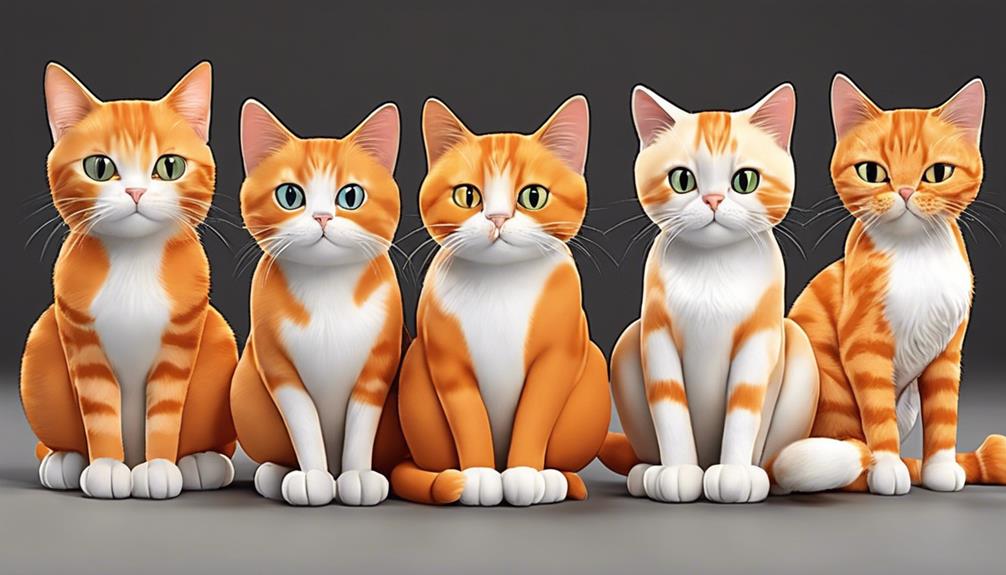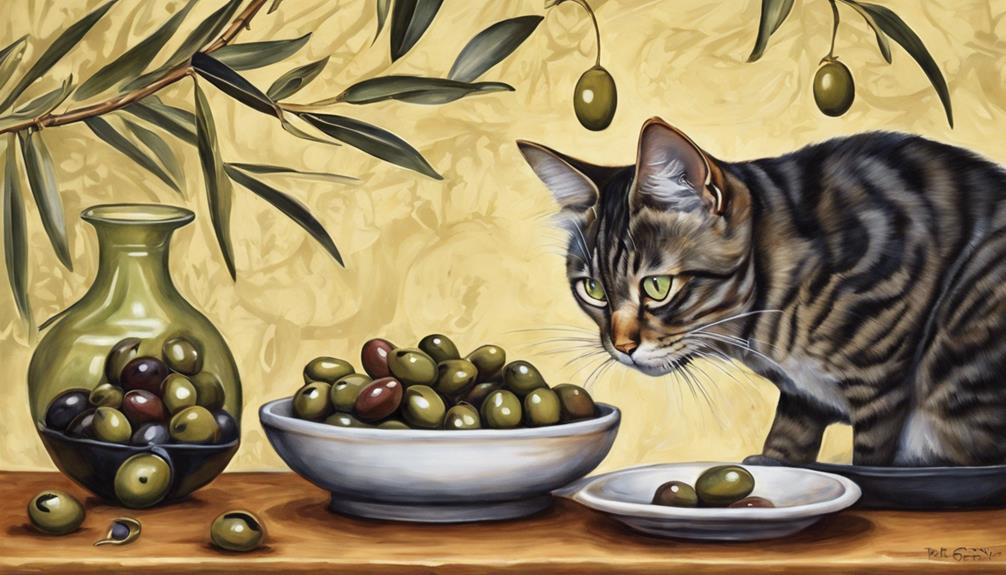We can feed cats turkey safely if it's plain, boneless, well-cooked meat with no harmful seasonings to guarantee their health. Remember, cats are obligate carnivores, so protein-rich diets like turkey are beneficial. When cooking turkey for cats, avoid toxic seasonings like garlic and onion, and remove bones to prevent choking. Limit treats to 10% of their diet, offering small portions to prevent stomach issues. Turkey skin is high in fat, so it's best to offer sparingly, removing the skin. Consulting a vet is important for dietary advice. Guarantee your cat's safety by feeding them plain, safe turkey.
Key Takeaways
- Cook plain, boneless turkey for cats to avoid harmful bacteria and choking hazards.
- Remove skin before feeding to prevent digestive issues from high fat content.
- Avoid seasoned turkey with toxic ingredients like garlic and onion.
- Limit turkey treats to 10% of daily calories to prevent nutritional imbalances.
- Consult a vet if turkey becomes a significant part of the cat's diet for professional advice.
Cats and Turkey Diet
When considering the dietary needs of cats, it's important to understand their unique requirements when it comes to incorporating turkey into their meals. Cats, being obligate carnivores, thrive on protein-rich diets, making turkey an excellent choice for them. Turkey isn't only a suitable protein source but also low in fat and calories, making it a healthy treat option for our feline friends.
Including turkey in a cat's diet can offer variety and essential nutrients. Many commercial cat foods incorporate turkey as part of the protein component, showcasing its benefits for our whiskered companions. However, when offering turkey to cats, it's essential to confirm it's plain, cooked, and free from seasoning or skin. This simple preparation ensures that cats can enjoy turkey safely without any potential harmful additives.
Cooking Turkey for Cats
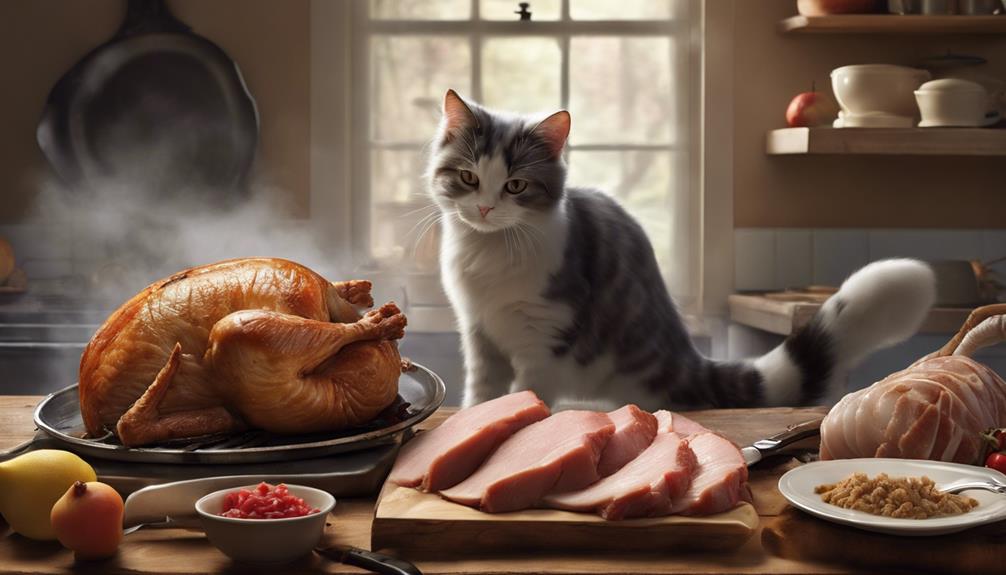
Moving from considering the dietary needs of cats in general, cooking turkey for cats requires careful attention to specific preparation methods to guarantee their safety and health. When preparing cooked turkey for our feline friends, it's essential to make sure the meat is thoroughly cooked to eliminate any harmful bacteria that could affect their well-being.
Additionally, it's important to avoid using seasonings like garlic, onion, or lemongrass, as these can be toxic to cats. Before serving the turkey to your cat, confirm that all bones have been removed to prevent any choking hazards. Offering plain, boneless, and well-cooked turkey meat can be a safe and delicious treat option for your cat.
You can also consider giving them unseasoned turkey organ meats in small amounts as a snack or meal topper, adding variety to their diet. By following these guidelines and being mindful of your cat's diet, you can prepare turkey in a way that's both enjoyable and safe for your furry companion.
Turkey Skin and Cats
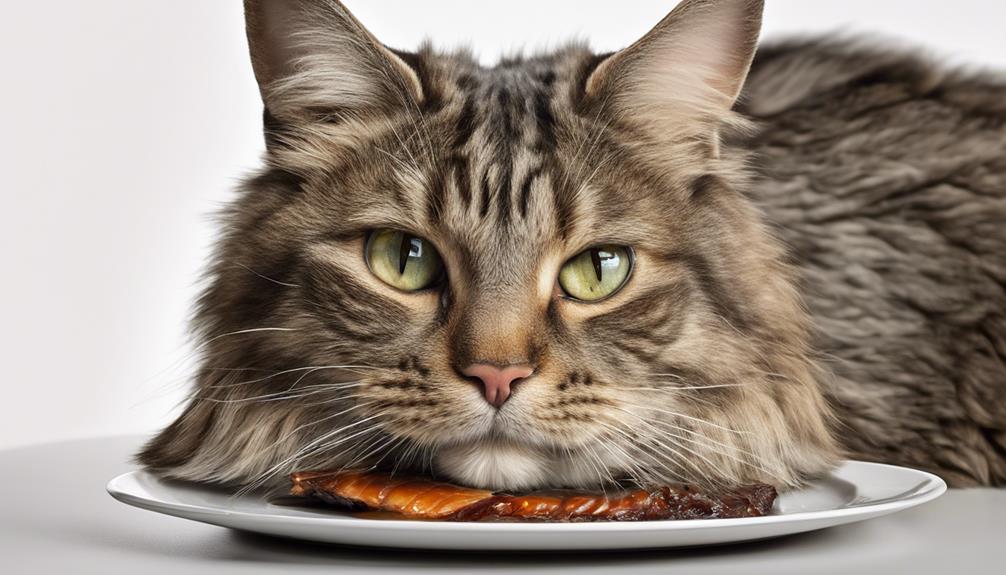
Considering the potential impact on feline health, cats should be offered turkey skin sparingly due to its high fat content, which can lead to digestive issues.
While cats may find the fatty skin of turkey delicious, it's crucial to remember that their digestive systems are sensitive and too much fat can upset their stomachs. High-fat foods like turkey skin should be a rare treat for our feline friends to avoid any potential tummy troubles.
This is particularly important for overweight or obese cats, as excess fat consumption can worsen existing health issues. To prevent any digestive problems, it's best to remove the skin before offering cooked turkey to cats.
Turkey Seasonings Dangers
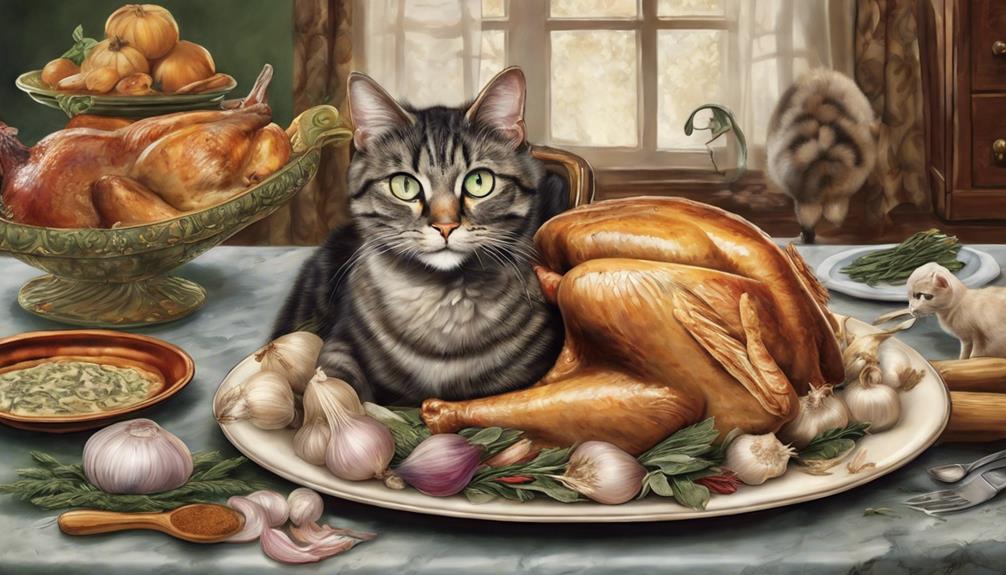
When it comes to feeding your feline friend some turkey, we need to be cautious about the seasonings we use. Some common spices like garlic, onion, and lemongrass can actually be harmful to cats.
Excessive salt intake from seasoned turkey can also pose health risks for our furry companions.
Seasoning Risks
To ensure the safety of cats, it's important to be mindful of the potential dangers of seasonings in turkey. Common seasonings such as garlic, onion, and lemongrass can be toxic and harmful to our feline friends. Cats should steer clear of seasoned turkey to avoid any unwanted complications that may arise from ingesting these seasonings.
Excessive salt intake from seasoned turkey can also lead to health issues in cats, making it vital to monitor their food intake closely. If your cat happens to ingest seasoned turkey, contacting a vet for guidance is essential. Remember, it's better to be safe than sorry when it comes to the well-being of our beloved pets.
Harmful Spices
We must be cautious of the harmful spices present in turkey seasonings that can pose serious risks to our feline companions. When it comes to our cats' health, avoiding seasoned turkey is essential. Here are some reasons why harmful spices in turkey seasonings can be dangerous for our furry friends:
- Toxic Ingredients: Garlic, onion, and lemongrass commonly found in seasoned turkey can be toxic to cats.
- Health Issues: Cats consuming seasoned turkey may experience various health problems due to the harmful spices.
- Avoidance is Key: It's important to steer clear of giving cats turkey with any added seasonings to prevent potential harm.
- Consult a Professional: If your cat accidentally ingests seasoned turkey, consulting a vet is vital to guarantee their safety.
Limiting Turkey Intake
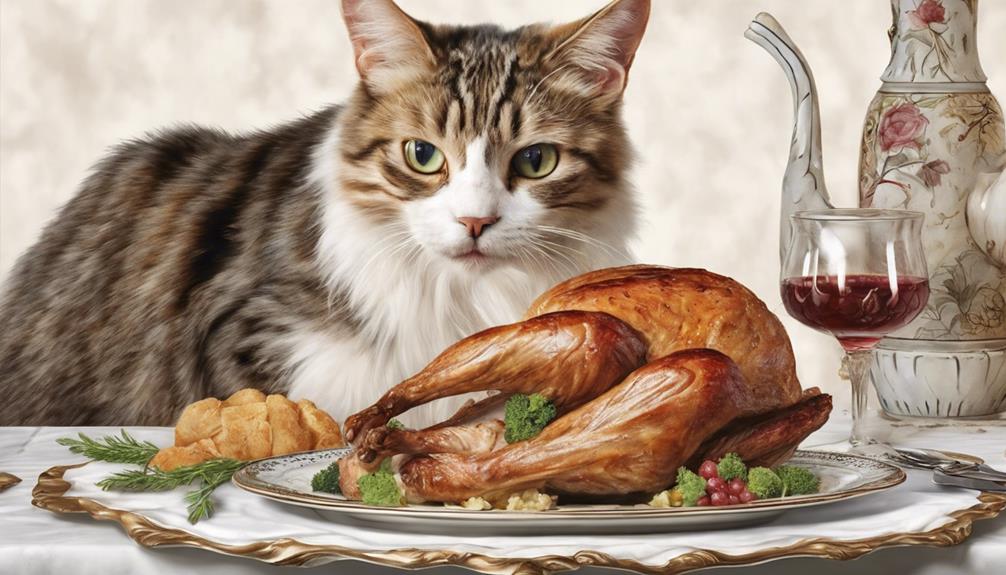
When it comes to feeding cats turkey, it's important to watch their intake closely. Overindulging in turkey can lead to potential health risks for our feline friends.
To make sure our cats stay healthy, we should stick to recommended portion sizes and frequency guidelines.
Portion Control for Cats
Managing a cat's consumption of turkey treats is crucial to maintaining their digestive health and overall well-being. To guarantee your feline companion stays healthy and happy, consider the following guidelines for portion control when it comes to giving them turkey treats:
- Restrict turkey treats to no more than 10% of a cat's total calorie intake.
- Recommended portion size for turkey treats is 2-3 thumbnail-sized pieces once or twice a week.
- Excessive indulgence in turkey treats can result in stomach upset and diarrhea in cats.
- Seek advice from a vet if turkey treats are a significant part of your cat's diet.
Potential Health Risks
To safeguard your cat's health, limiting their intake of turkey is essential due to potential health risks associated with excessive consumption. Cats are prone to pancreatitis if they consume too much turkey, especially seasoned or dark meat. It's important to keep cooked turkey treats to a maximum of 10% of their diet to prevent health issues.
Additionally, raw or undercooked turkey poses salmonella and listeria risks to cats, making it unsafe for consumption. Deli turkey meat, often high in sodium and containing harmful additives, can also be detrimental to your feline friend's well-being. By being mindful of these risks and moderating your cat's turkey intake, you can help safeguard their health and happiness for years to come.
Raw Turkey Risks
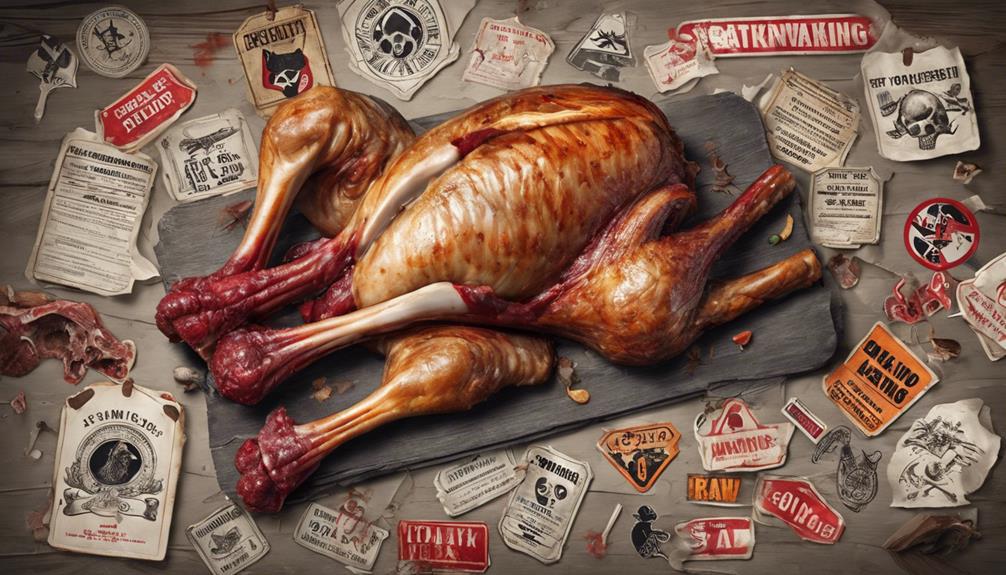
Feeding cats raw turkey poses significant risks due to the potential presence of harmful bacteria such as salmonella and listeria, which can lead to severe illnesses in cats and humans. When it comes to raw turkey risks, it's important to take into account the following:
- Cooking the Meat: Cooking turkey thoroughly is vital to eliminate any harmful bacteria present, making it safe for your feline friend to consume.
- Raw or Cooked: Opting for cooked turkey over raw is the safest choice to prevent foodborne illnesses in cats and humans.
- Health Issues: Feeding raw turkey to cats can result in severe health complications, including digestive problems and infections, so it's best to avoid raw diets.
- Safety First: To steer clear of potential health risks associated with raw meat, always make sure that any turkey you offer your cat is cooked properly.
Turkey in Cat Food
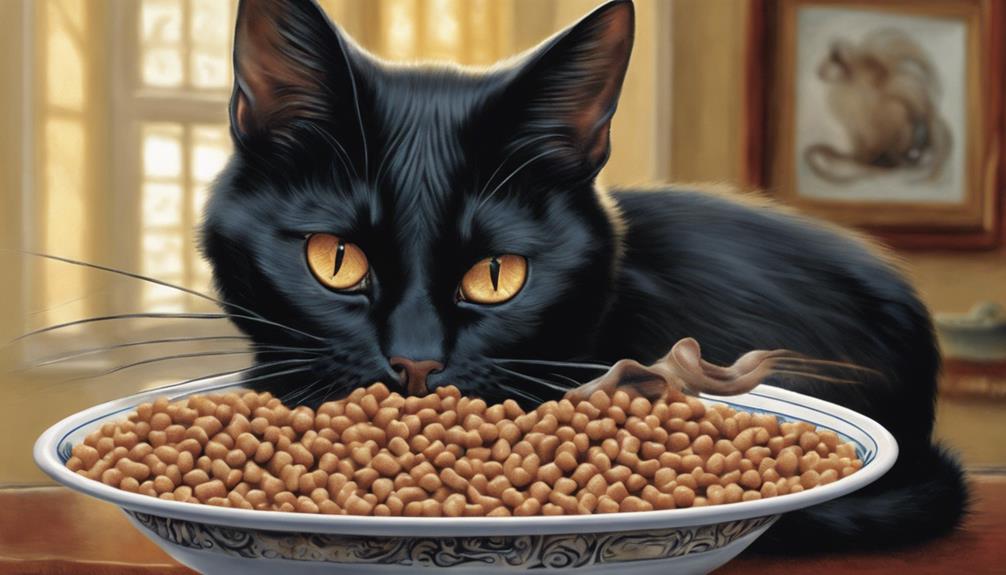
When considering the incorporation of turkey in cat food, it's important to acknowledge that commercial cat foods often include turkey as a significant part of the protein source. Cats benefit from the nutrients in turkey, such as B vitamins, selenium, and magnesium, which contribute to their overall health. The amino acid tryptophan found in turkey can also be beneficial for your feline companion. It's vital to choose high-quality cat food brands that incorporate turkey to guarantee a balanced diet for your cat.
Including turkey in cat food can provide essential proteins and nutrients necessary for your cat's well-being. When exploring cat food options, consider those that contain turkey as a primary meat source to support your cat's health. Seeking advice from a vet can also provide valuable insights into selecting the best cat food with turkey for your furry friend. By opting for cat foods with turkey, you can help maintain your cat's health and provide them with a tasty meal they'll enjoy.
Health Benefits of Turkey
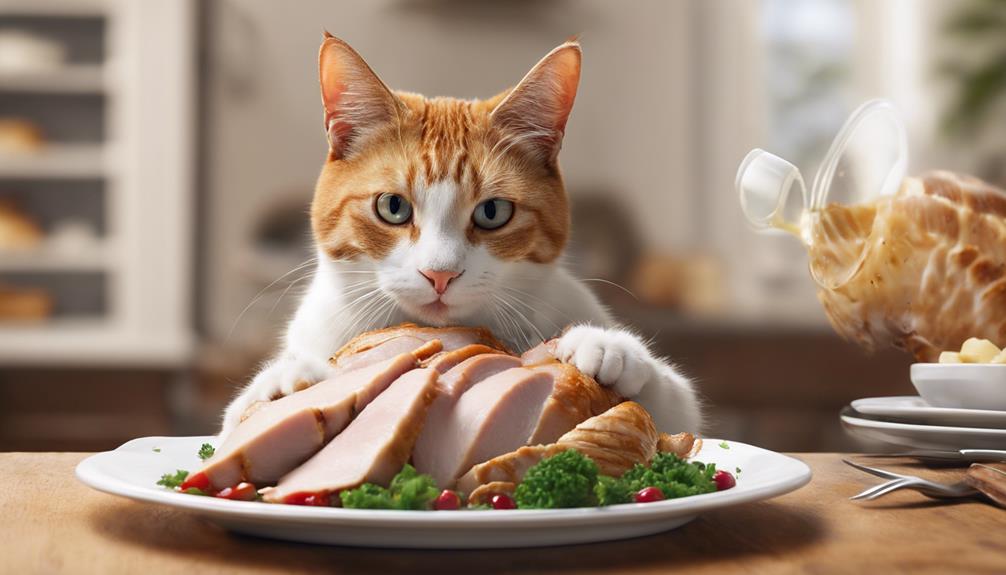
Turkey offers numerous health benefits for our feline friends, including being a great source of protein essential for muscle health.
Additionally, this lean meat is packed with important nutrients like B vitamins, selenium, magnesium, and potassium, promoting overall well-being in cats.
With its low saturated fat content, turkey serves as a nutritious option that can benefit your cat's diet.
Protein for Muscle Health
Including turkey in our feline friends' diet provides essential protein for their muscle health and overall well-being. Here are some key points to ponder about the benefits of turkey for our beloved cats:
- Protein for Muscle Health:
Turkey is a great source of protein that helps in maintaining lean muscle mass, promoting strength and agility in cats.
- Taurine Support:
The amino acid taurine, present in turkey, is vital for heart function and vision in cats, preventing potential health issues associated with taurine deficiency.
- Digestibility:
The protein from turkey is easily digestible for cats, aiding in proper growth and development.
- Overall Strength:
Nutrient-Rich White Meat
White meat turkey, a nutrient-rich option, offers various health benefits for our feline companions. It's packed with essential nutrients like B vitamins, selenium, magnesium, and potassium, all important for supporting overall feline health.
Additionally, white meat turkey contains taurine, an important amino acid essential for cats' immune system, digestive health, and organ function. Including this lean protein in our cats' diet can help meet their nutritional needs as obligate carnivores.
Not only is turkey low in calories and fat, making it a healthy protein source, but it also provides a range of benefits without compromising their dietary requirements.
Feeding our furry friends small amounts of cooked white meat turkey is a great way to introduce these health benefits without causing drowsiness, debunking the myth.
Low in Saturated Fat
We appreciate the health benefits that come with incorporating low-saturated fat options like turkey into our furry companions' diets. Turkey is good for cats because it's a lean protein source that supports their overall well-being. When considering your cat's diet, opting for turkey can provide a complete and balanced meal due to its nutrient-rich profile. Here are some reasons why turkey is a great choice for your feline friend:
- Turkey is lean and helps maintain your cat's health.
- It offers essential nutrients without excessive saturated fat content.
- The low saturated fat in turkey makes it suitable for cats prone to weight issues.
- Including lean, cooked turkey as a treat can contribute to a balanced and healthy feline diet.
Allergic Reactions to Turkey
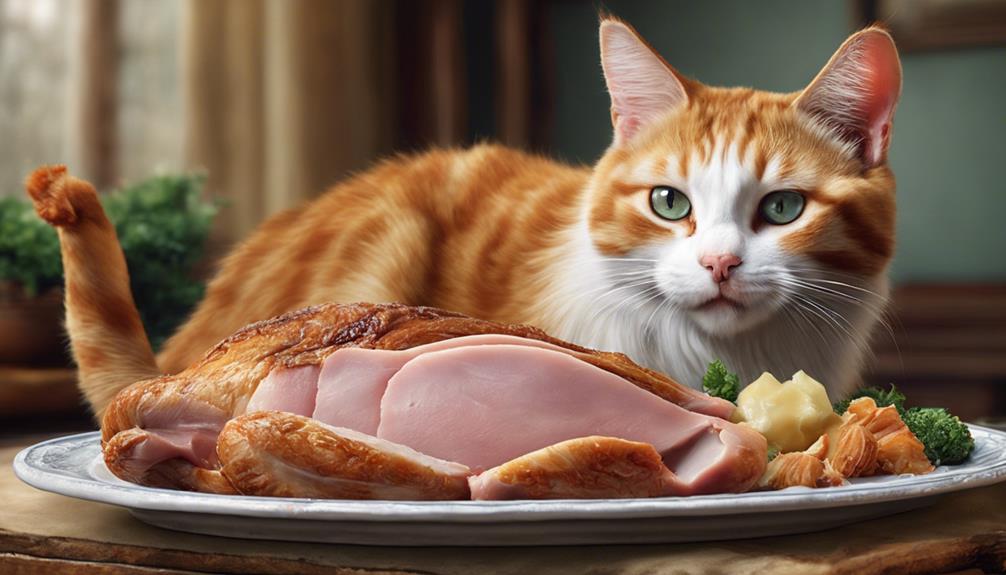
Experiencing allergic reactions to turkey can pose serious health risks for cats. Just like humans, our feline friends can develop food allergies, with symptoms ranging from itching, redness, and swelling to vomiting and diarrhea. These reactions may be a result of their immune system identifying turkey proteins as harmful invaders, leading to skin problems or digestive issues.
If you notice any signs of an allergic reaction in your cat after consuming turkey, it's essential to seek vet consultation promptly. Your veterinarian can help determine the specific allergens causing the reactions through food trials, allowing for better management of your cat's dietary needs.
Turkey Induced Sleepiness
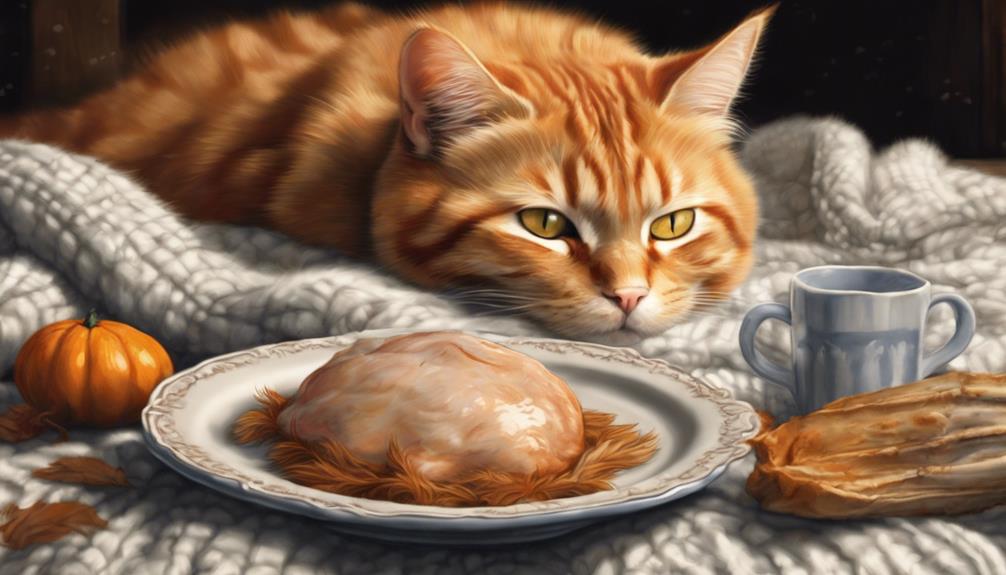
Consuming small amounts of cooked turkey is unlikely to induce sleepiness in cats due to the minimal effect of the amino acid tryptophan present. While tryptophan in turkey may mildly calm cats, it doesn't lead to significant drowsiness.
Here are four key points to take into account regarding turkey-induced sleepiness in felines:
- Tryptophan Content: Turkey does contain tryptophan, but the levels aren't substantial enough to cause noticeable sleepiness in cats.
- Minimal Effect: The calming effect of tryptophan in turkey is minimal and not potent enough to induce significant drowsiness in feline companions.
- Taurine Production: Cats naturally synthesize taurine from proteins like turkey, which is essential for their health and not associated with inducing sleepiness.
- Mythical Nature: The idea of turkey-induced sleepiness is a common myth among humans and doesn't directly apply to cats' metabolism.
Deli Turkey Concerns
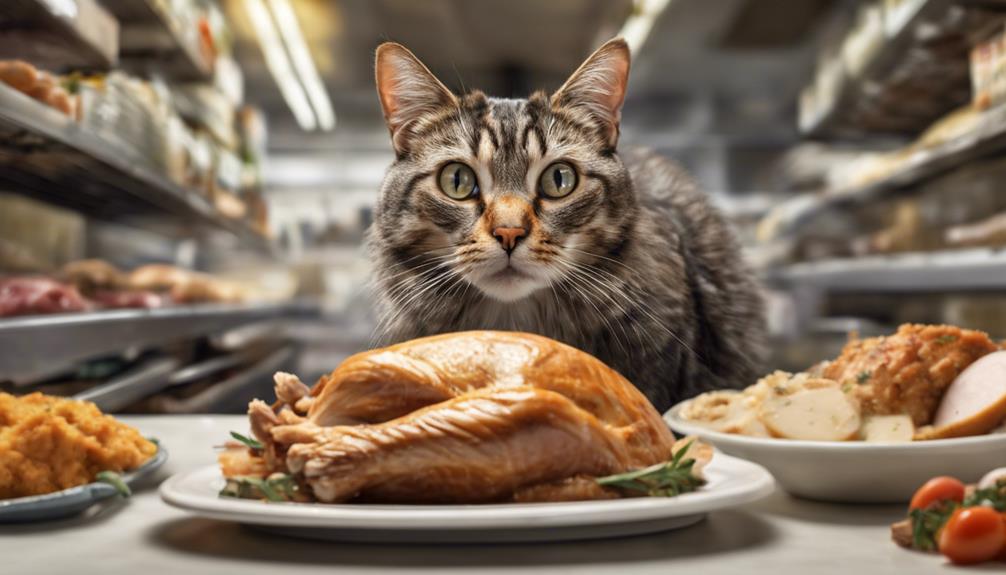
Avoiding deli turkey is crucial for cats due to its high sodium and harmful additives that can be detrimental to their health. Processed deli turkey often contains nitrates and other additives that aren't recommended for our feline friends. The sodium content in deli turkey is much higher than what cats should consume, leading to potential health issues if ingested regularly. While a small bite mightn't cause immediate harm, it's best to steer clear of offering deli turkey as a treat to your beloved cat.
Opting for plain, cooked ground turkey is a safer alternative for cats compared to processed deli turkey. Homemade plain cooked turkey patties can be a healthier and more wholesome treat option for your cat. By avoiding deli turkey and opting for simpler, less processed options, you can guarantee that your cat enjoys their turkey treat without any potential harm from excessive sodium or harmful additives.
Turkey Bones Caution
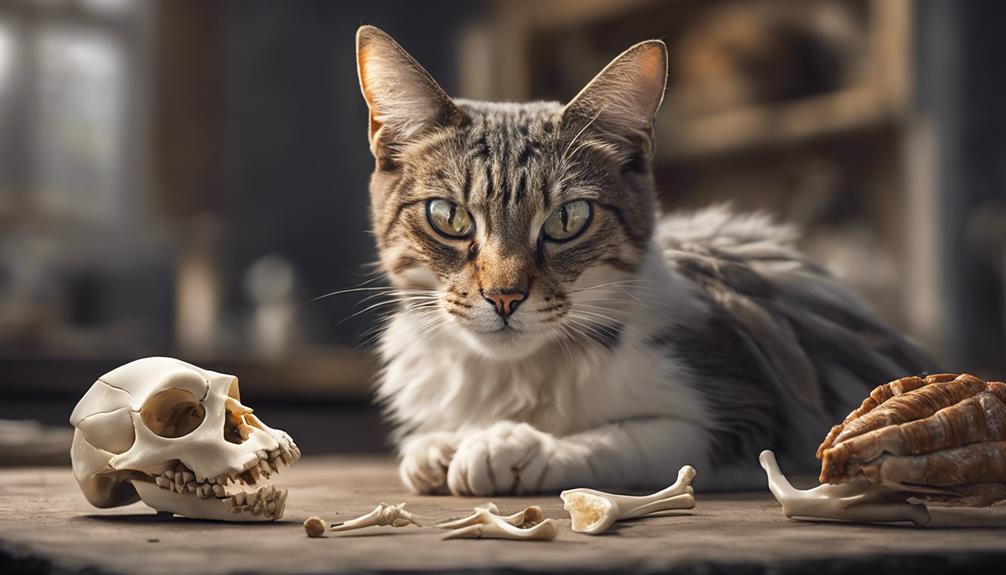
When providing turkey to cats, it's essential to eliminate all bones to prevent potential choking hazards and injuries. Here are some important points to keep in mind:
- Choking Hazards: Turkey bones can easily splinter, posing a risk of choking if swallowed by cats.
- Injuries in the Mouth: Sharp bone fragments can cause cuts and harm in the mouth of cats while consuming turkey.
- Organ Damage: If consumed, bones can puncture the esophagus or intestines, leading to serious internal injuries.
- Precaution: Always make sure that any turkey meat offered to cats is bone-free to avoid any harm or discomfort.
It's vital to prioritize the safety and well-being of our feline companions by being mindful of the potential dangers associated with turkey bones. By taking a few extra moments to remove bones before serving turkey, we can help keep our cats safe and healthy during mealtime.
Turkey Bacon for Cats
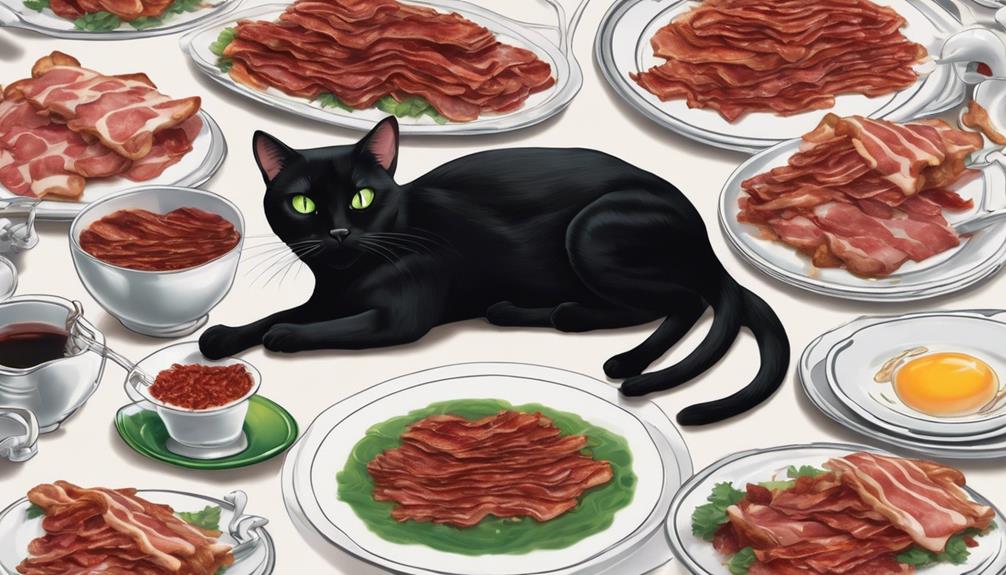
Turkey bacon poses health risks for cats due to its high salt, preservatives, and fat content, making it an unsuitable treat option. While cats eat turkey as part of their diet, turkey bacon is a different story. The added salt and preservatives in turkey bacon can be harmful to our feline friends, potentially leading to health issues if consumed regularly.
Instead of risking their well-being, opt for plain, cooked turkey as a safer alternative. Cats can enjoy the goodness of cooked turkey without the unhealthy extras found in processed turkey bacon. By offering plain, cooked turkey, you provide a tasty treat that's less likely to upset their delicate systems.
Safe Turkey Feeding Practices
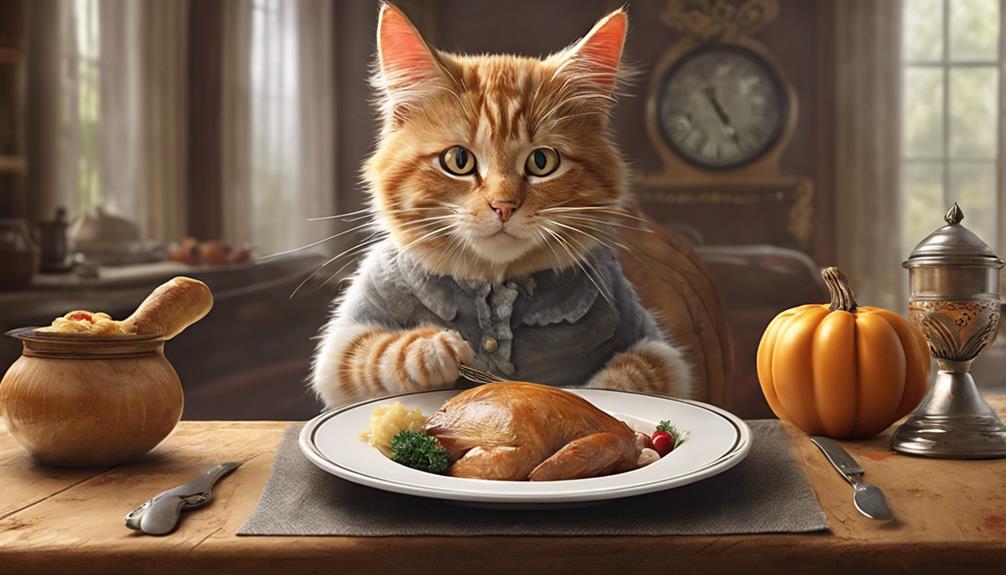
After considering the risks of offering turkey bacon to cats, focusing on safe turkey feeding practices becomes crucial to guarantee our feline friends' well-being. When it comes to feeding your cat turkey, it's vital to follow these best practices for pet health:
- Limit Treats: Treats shouldn't make up more than 10% of your cat's daily calorie intake when feeding them turkey.
- Watch the Skin: Be cautious with turkey skin as it's high in fat, so it's best to avoid giving large amounts to your cat.
- Consult a Vet: If your cat consumes significant quantities of turkey, consulting a vet can ensure it's safe for them.
- Stick to Plain Turkey: Feed your cat plain, cooked turkey without any spices or seasonings to maintain their well-being.
Monitoring Turkey Consumption
Monitoring your cat's turkey intake is crucial to guarantee their dietary balance and overall health. To make sure your feline friend maintains a balanced diet, it's important to keep track of how much turkey they're consuming.
Limit their turkey consumption to no more than 10% of their daily calorie intake, as exceeding this amount could lead to nutritional imbalances. When offering turkey treats, stick to 2-3 thumbnail-sized pieces once or twice a week.
If you notice that turkey treats are becoming a significant part of your cat's diet, it's advisable to consult with a vet for guidance on how to adjust their feeding routine. Be cautious of seasoned, processed, or dark meat turkey, as these may not be suitable for your cat's consumption.
Always prioritize your cat's well-being by ensuring that any turkey treats given to them are safe and healthy. By monitoring your cat's turkey consumption closely, you can help them maintain a healthy and balanced diet.
Frequently Asked Questions
Is Chicken or Turkey Better for Cats?
We believe chicken is better for cats due to its lower fat content. While turkey can be safe in moderation, chicken's lean protein is easier to digest. When choosing between the two, chicken is often preferred.
Can I Give My Cat Turkey Lunch Meat?
We should avoid giving our cats turkey lunch meat due to its high sodium and potential additives. Opt for plain, cooked white meat turkey as a safer alternative. Always consult with a vet before introducing new foods to our feline friends.
Can I Feed My Cat Turkey Giblets?
We love giving our cats turkey giblets as a treat. It's crucial to cook them thoroughly and avoid seasonings. Moderation is key to prevent tummy troubles. Checking with a vet beforehand guarantees it's safe for your fur baby.
Can Cats Eat Turkey Heart and Liver?
Turkey heart and liver are safe for cats in small amounts. These organ meats are packed with essential nutrients. Remember, moderation is key. Consult your vet to determine the right serving size for your cat.
Conclusion
To sum up, while cats can enjoy turkey in moderation, it's important to be mindful of certain dangers such as bones and seasonings. By sticking to plain, cooked turkey and monitoring their intake, you can safely treat your feline friend to a tasty snack.
Remember, a little turkey goes a long way in keeping your cat happy and healthy! Just like Thanksgiving leftovers, it's all about balance and moderation.
